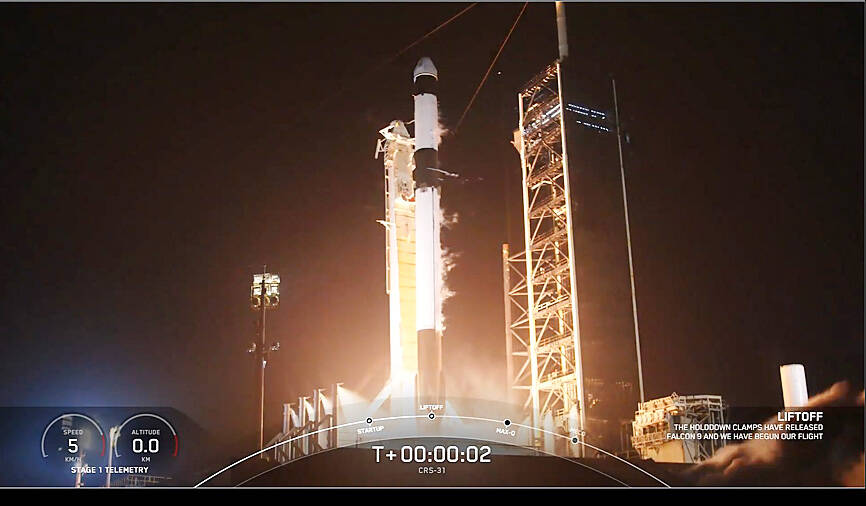Onglaisat, a satellite codeveloped by Taiwan and Japan, was successfully launched into space on Monday aboard a SpaceX Falcon 9 rocket, the Taiwan Space Agency (TASA) said yesterday.
The cube satellite, or cubesat, is scheduled to reach the International Space Station and be deployed into a 410km low Earth orbit in about one month to begin its test mission, the agency said in a statement.
During the six-month mission, Onglaisat would be used to validate the key technologies of a newly developed remote sensing system, said the agency, which is part of the National Science and Technology Council.

Photo courtesy of the Taiwan Space Agency
Onglaisat, which was launched aboard SpaceX’s CRS-31 resupply mission from Cape Canaveral, Florida, would test high-resolution data collection and image compression technologies it developed in collaboration with the Taiwan Semiconductor Research Institute, the agency said.
The small satellite would achieve a ground image resolution of 2.8m, surpassing the typical resolution of 5m to 6m for satellites of the same class, said Chan Chen-yu (詹鎮宇), the project’s leader.
The satellite, codeveloped by TASA and the Intelligent Space Systems Laboratory at the University of Tokyo’s Department of Aeronautics and Astronautics, along with several start-ups, also offers a valuable opportunity for scientific exchange and study, Chan said.
“Onglai” is a Hoklo (commonly known as Taiwanese) word that symbolizes aspirations for joint efforts between the two countries in space, he said.
The name means “prosperity” and “pineapple,” reflecting the launch, and hope for an enduring friendship and collaboration between Taiwan and Japan, he said.
The satellite was named in 2021, when Taiwan was seeking to expand its pineapple exports following a ban by China on the fruit from Taiwan, Chan said.
Japan showed strong support by purchasing large quantities, a gesture that resonated deeply with many Taiwanese, he added.

CAUTION: Based on intelligence from the nation’s security agencies, MOFA has cautioned Taiwanese travelers about heightened safety risks in China-friendly countries The Ministry of Foreign Affairs (MOFA) yesterday urged Taiwanese to be aware of their safety when traveling abroad, especially in countries that are friendly to China. China in June last year issued 22 guidelines that allow its courts to try in absentia and sentence to death so-called “diehard” Taiwanese independence activists, even though Chinese courts have no jurisdiction in Taiwan. Late last month, a senior Chinese official gave closed-door instructions to state security units to implement the guidelines in countries friendly to China, a government memo and a senior Taiwan security official said, based on information gathered by Taiwan’s intelligence agency. The

Taiwan Semiconductor Manufacturing Co (TSMC), the world’s largest contract chipmaker, said yesterday that it is looking to hire 8,000 people this year, at a time when the tech giant is expanding production capacity to maintain its lead over competitors. To attract talent, TSMC would launch a large-scale recruitment campaign on campuses across Taiwan, where a newly recruited engineer with a master’s degree could expect to receive an average salary of NT$2.2 million (US$60,912), which is much higher than the 2023 national average of NT$709,000 for those in the same category, according to government statistics. TSMC, which accounted for more than 60 percent

Tung Tzu-hsien (童子賢), a Taiwanese businessman and deputy convener of the nation’s National Climate Change Committee, said yesterday that “electrical power is national power” and nuclear energy is “very important to Taiwan.” Tung made the remarks, suggesting that his views do not align with the country’s current official policy of phasing out nuclear energy, at a forum organized by the Taiwan People’s Party titled “Challenges and Prospects of Taiwan’s AI Industry and Energy Policy.” “Taiwan is currently pursuing industries with high added- value and is developing vigorously, and this all requires electricity,” said the chairman

The National Immigration Agency (NIA) said yesterday that it will revoke the dependent-based residence permit of a Chinese social media influencer who reportedly “openly advocated for [China’s] unification through military force” with Taiwan. The Chinese national, identified by her surname Liu (劉), will have her residence permit revoked in accordance with Article 14 of the “Measures for the permission of family- based residence, long-term residence and settlement of people from the Mainland Area in the Taiwan Area,” the NIA said in a news release. The agency explained it received reports that Liu made “unifying Taiwan through military force” statements on her online